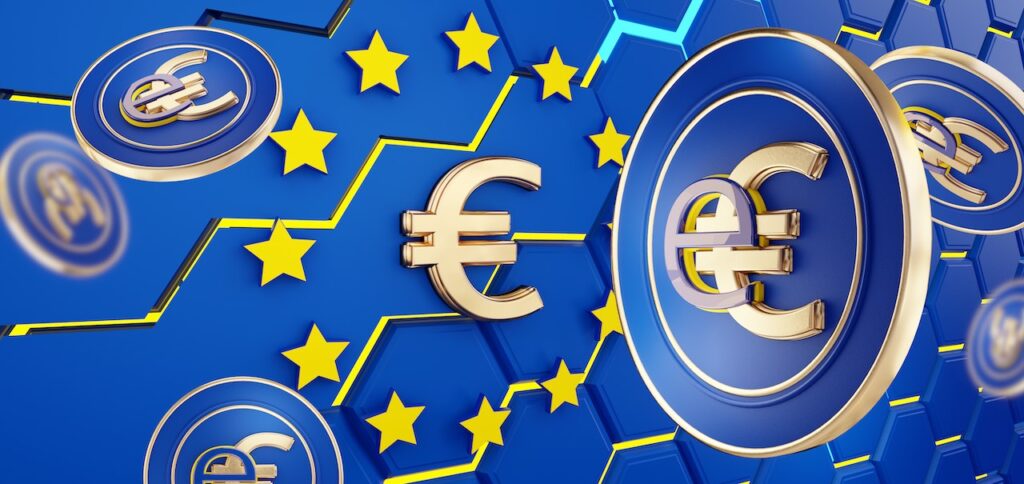
Euro Gives Up In the ever-evolving landscape of global currencies, the Euro has recently taken a hit, relinquishing its one-week high against the US dollar. The reason behind this shift can be attributed to the mounting geopolitical concerns in the Middle East, which have triggered a surge in the demand for safe-haven assets.
Euro’s Initial Ascent and Subsequent Decline
Euro Gives Up At the beginning of the week, the Euro started on a downward trajectory. This can be attributed to the attack orchestrated by the Palestinian military group, Hamas, on Israel over the weekend. The conflict that ensued during these fateful days has been described as one of the bloodiest incidents in the region in the last 50 years.
EUR/USD, the Euro’s exchange rate against the US dollar, experienced a 0.35% decline, settling at 1.0547. This followed a notable 0.35% rise on the previous Friday, marking the third consecutive day of profit and reaching a peak of 1.0574. The Euro had previously reached a week-high of 1.0600 after mixed US labor data.
It’s noteworthy that the Euro had shown signs of recovery, with a 0.1% gain against the dollar during the preceding week. This marked its first weekly profit in three months, following a period of decline that had seen it touch ten-month lows at 1.0448.
Euro Gives Up Geopolitical Tensions Escalate
The Middle East found itself engulfed in heightened tensions as Hamas initiated a surprise attack on Israel. Tragically, this conflict has resulted in the loss of nearly 1,100 lives to date. In response to this crisis, the United States has announced plans to dispatch an aircraft carrier along with 5,000 soldiers to the region.
The Strengthening Dollar
Conversely, amidst the turmoil in the Middle East, the US dollar has shown strength. The dollar index rose by 0.2% on Monday
indicating its first profit in four days against a basket of major rival currencies.
Investors have begun to flock to the US dollar as a safe-haven asset, a trend that typically occurs during times of heightened geopolitical uncertainty. This shift has led to the abandonment of riskier assets as investors seek stability in uncertain times.
Over the weekend, a statement from Federal Reserve official Michelle Bowman added to the mix. Bowman expressed concerns about high inflation levels in the United States and suggested that further policy tightening might be necessary to address this issue.
Euro Gives Up Conclusion
In conclusion, the Euro’s recent retreat from its one-week high against the US dollar is primarily attributed to the geopolitical tensions unfolding in the Middle East. The conflict initiated by Hamas and the subsequent response from the United States have created a climate of uncertainty
prompting investors to seek refuge in the US dollar.
As the situation continues to evolve, the impact on global currencies and financial markets remains uncertain. It is essential for investors and market participants to closely monitor the developments in the Middle East and their implications on currency exchange rates.
Frequently Asked Questions
1. How has the Euro performed in recent months before this decline?
Before this decline, the Euro had experienced a period of decline, reaching ten-month lows against the US dollar. However, it showed signs of recovery with a 0.1% gain against the dollar in the preceding week.
2. What triggered the Euro’s decline in value?
The Euro’s decline can be attributed to the recent conflict in the Middle East
initiated by the Palestinian military group Hamas. This event led to heightened geopolitical tensions and a surge in demand for safe-haven assets.
3. How has the US dollar reacted to the geopolitical tensions in the Middle East?
The US dollar has strengthened in response to the geopolitical tensions in the Middle East. Investors have sought the US dollar as a safe-haven asset, leading to its rise in value.
4. What did Federal Reserve official Michelle Bowman say about inflation in the US?
Michelle Bowman expressed concerns about high inflation levels in the United States
and suggested that further policy tightening might be necessary to address this issue.
5. How should investors monitor the situation in the Middle East for its impact on currencies and financial markets?
Investors and market participants should closely monitor the developments in the Middle East
and their implications on currency exchange rates as the situation continues to evolve. Staying informed is crucial in navigating uncertain times.
